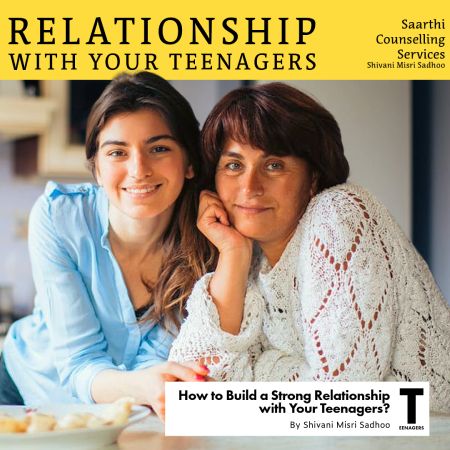Have you ever felt like you’re in a whirlwind when trying to connect with your teenager? Well, you’re not alone. Adolescence is like a perfect storm for relationships between teens and parents. It’s a time when they crave independence, yearn for acceptance from peers, and embark on a quest to discover who they truly are. But here’s the thing: beneath the surface, they’re more vulnerable than they let on.

How do you form a strong relationship with your teenagers?
Let’s explore the turbulence of adolescence and find out how to anchor a strong bond with your teenagers with the help of renowned psychologist and relationship expert, Shivani Misri Sadhoo.
Lend Your Ears – When you take the time to listen to your teen, it shows you care about them and what they have to say. This makes them feel safe and closer to you. When you’re open to hearing them out instead of just telling them what to do, they see you as someone they can trust.
By listening, you might also notice qualities in them that could make them great leaders. So, when you make an effort to listen to your teen, you’re not just hearing their words—you’re building a stronger bond with them.
Give them Unconditional Love – Love them just as they are, without trying to change them. Teens really want to feel understood and loved for who they are. They’re more sensitive than we might think.
Showing love and respect helps them feel valued, especially when they struggle to value themselves. When you love them unconditionally, it builds trust and strengthens your bond. They’ll feel safer to open up and share their thoughts and feelings with you.
Set Healthy Boundaries – Setting boundaries with teens is crucial for building trust and ensuring a safe relationship. Even if not requested, they’ll appreciate it. Use the TAP method: Take a breath, Acknowledge feelings, and Proceed by calmly discussing boundaries. Clearly communicate expectations about curfews and chores, and enforce consequences with love and understanding when rules are broken.
Know their Social Circle – Perhaps the best way to bond with your teen is by getting to know their friends. Being part of their social circle strengthens your relationship. It encourages them to share about their social life, ensuring they’re in good company.
This eases your worries when they’re out. Showing interest in their friends demonstrates care, fostering a supportive bond. However, balance involvement with respecting their privacy.
Don’t Compare or Criticize with Their Siblings – Avoid criticizing or comparing your teenager to their siblings. Nothing hurts more than hearing a parent complain about them to others. Remember, each person is unique. Teaching self-control is crucial. Some teens may not express their hurt, but it runs deep. Treat them with respect for a healthy relationship.
You Lead by Example – Children often look to their parents as role models. By leading by example, you show your teenager what healthy relationships are all about. When you demonstrate respect, empathy, and effective communication in your interactions with them and others, you strengthen your bond with your teen. Your actions speak louder than words, and being a positive role model can inspire them to emulate your behaviour in their relationships.
They Still Need You As Their Parent – If you feel like your teenager is all grown up and distant, remember that they still need you as their parent. Even though they might seem independent, they’re facing things they might not talk about.
Take time to just be with them—watch a show, go for a drive, plan a weekly date. No lectures, no agenda, just quality time. It’s these moments that strengthen your bond and show them you’re still there, no matter how big they get. It’s an investment in a strong relationship that lasts into adulthood.
No matter how turbulent adolescence may seem, building a strong bond with your teenager is achievable. By listening, loving unconditionally, setting boundaries, knowing their social circle, avoiding comparisons, leading by example, and simply being there, you can nurture a relationship that lasts well beyond their teenage years.

Shivani Misri Sadhoo is an internationally recommended relationship Counsellor by world’s biggest and most trusted study and research-based foundation for couples therapy – Gottman Institute. She is trained on specialised key relationship counselling Skills from AIIMS, VIMHANS and various other reputed institutions. Counselor Shivani Misri Sadhoo, is also Certified for Emotionally Focused Therapy, Cognitive Behavioral Therapy and Dialectical Behaviour Therapy.
Counsellor Shivani Misri Sadhoo is also a Certified Neuro Linguistic Practitioner with specialised training and experience in the field of affairs/betrayals, trust issues, difficulty communicating, conflicting values, bereavement, grief and loss (affairs, separation, divorce, childhood) and emotional health issue (anxiety, social anxiety, fear, depression, low mood).
Currently, Shivani Misri Sadhoo is one of the top counsellors with the HIGHEST Success Rate with over 17,000 happy couples and individuals (based in India and abroad), who has benefited from her therapy. Psychologist and Counselor Shivani Misri Sadhoo not only practice independently from her clinic in Greater Kailash, Delhi, India but also listed on the panel of eminent hospitals like IBS Hospital – Institute of Brain & Spine, Express Clinic, Fortis (formerly) based in Delhi.



